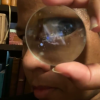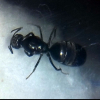Hey all,
Not really an urgent question here but just something I've been curious about in my observations, and wanted to see what y'all thought. I'm pretty new to ant keeping but I've done a lot of research in the months leading up to ant season. One thing I came across frequently was this idea that workers only really need a sugar source and that the protein is primarily needed by the queen and larvae since it is a building block of life.
I've been keeping a queen-less Tetramorium colony that I aspirated from my girlfriend's kitchen (she was going to have them wiped out so I figured I'd get as many as I could, keep them as an experiment, and get practice before I catch a Tetramorium queen myself this summer). I was able to aspirate probably 200-300 workers. I've noticed that when I feed them honey, or honey water they immediately cover it up with dirt and don't drink any of it (so I'm assuming). I started feeding them a piece of apple. They will drink this, and this is primarily how I feed them a sugary source. What surprises me the most though is that when I feed them protein they swarm it like crazy, and sometimes when given a meal worm they will even carry it into their tunnels they've dug beneath the flat rock I put on their substrate.
Considering the colony is queen-less, what are they doing with this protein I provide? I'm assuming that despite everyone saying workers don't need protein they actually do need some protein. Are they just gathering it on instinct? If they eat a bunch of protein, and have no need for it, and it's just sitting in their social stomach, what do they end up doing with it? I've just been surprised at how readily and eagerly they go for the protein every single time I provide it when it seems like they don't show that level of enthusiasm for anything else I provide, especially sugary sources.
Any thoughts or information? Mostly just curious what use a queen-less colony has for so much protein.




















